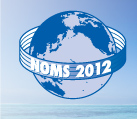| |
PANELS
Panel P1: Software-defined Networking
Room: Pequod
Moderator: Dominique Dudkowski, NEC, Germany
Panelists: Yoshiaki Kiriha (NEC), Masum Hasan (Cisco), Ricardo Bennesby Da Silva (UFRGS), Vijay Mann (IBM Research India)
Tuesday, 14:15pm-15:45pm, April 17, 2012
Abstract:
Many networks are traditionally defined by ‘black boxes’ combining software and hardware as an inseparable unit. Innovations in such an environment can only happen through the standards bodies or through ingenious exploits of, often proprietary, features.
In contrast, the computer industry has profited for a long time from the clean separation of hardware capability and the software providing a multitude of services, separated by a relatively stable and minimal interface (e.g. x86 command set). Support for efficient and secure ‘slicing’ (virtualization) opened the door for new business models and allowed the creation of new services on top of services provided and managed by others.
There is now increased interest in academia as well as industry to do the same for network equipment and with it “open up” the network. Several approaches and directions are currently discussed (OpenFlow (ONF), Network APIs at various levels (e.g. BBF).
The objective of this panel is to discuss Software-defined Networking and the impact it has for network control and management. The panel will be composed of people from academy and industry, to exchange ideas, present exiting new approaches, as well as openly discuss the challenges and opportunities of such a new approach to stimulate healthy discussions.
Moderator's Biography:
Dominique Dudkowski received his diploma in computer science in 2002 and his doctoral degree in mobile communications in 2009 from Stuttgart University, Germany. He worked as a research and teaching assistant in the Distributed Systems Group at University Stuttgart, focusing on data management, context-based services and query/event processing in mobile ad hoc networks. In 2008 he joined the Network Management Group of NEC Laboratories Europe in Heidelberg, Germany. At the labs, he has been working on management principles and architectures for the future Internet and cloud networks within the large-scale EU projects 4WARD and SAIL, on energy-efficient solutions for data center networks based on OpenFlow, and on M2M standardization.
Presentations: Dominique Dudkowski, Yoshiaki Kiriha, Masum Hasan, Ricardo Bennesby Da Silva & Vijay Mann
Panel P2: Information-Centric Network: which Impact on Network Design & Operations?
Room: Pequod
Moderator: Prosper Chemouil, Orange Labs, France
Panelists: Dominique Dudkowski (NEC), Raouf Boutaba (University of Waterloo)
Wednesday, 10:15am-11:45am, April 18, 2012
Abstract:
In the last few years, there has been a tremendous research activity on Future Internet Architecture which resulted in some kind of disruptive solutions. The concept of Information-Centric Networking is focusing on named objects and is proposing an alternative to the current Internet which is based on host-to-host communications. Additionally, Information-Centric Networking benefits of new in-network storage capabilities which allow developing a new network architecture which is adapted to more pervasive communications. As such, this new architecture provides scalable, efficient, and reliable distribution of content, in-network storage, and multi-party communications among others.
However this architecture is not directly supported by existing infrastructure and raises many challenges that are considered through several projects worldwide. Approaches such as Content-Centric Networking (CCN), NetInf (Network of Information) or Publish-Subscribe models are currently addressing different issues related to the Design and Operations of Information-Centric Networking, such as naming, routing and transport, caching, network management and new business roles.
The panel is intended to address some of these issues which are in the scope of Network Operations and Management, in a broad sense, such as:
-
Naming aspects and name resolution
-
Transport and routing methods
-
Congestion control and load balancing
-
Multi-homing and Mobility Management
-
Distributed caching mechanisms
-
Self-Management aspects
-
Security management
-
Potential ICN applications
-
Business Models
Moderator's Biography:
Prosper Chemouil is currently Director of Research Program in the area of Networks and Systems at Orange Labs (http://perso.rd.francetelecom.fr/chemouil/). He graduated from École Centrale de Nantes, France in 1975 and obtained a PhD in control theory in 1978. His main interests are with the management and engineering of Future Networks, including new content delivery approaches. He is thus concerned with issues like routing and transport mechanisms, QoS and performance models, network and service management in the framework of post-IP networks based on virtualization, programmable and autonomic networking.
Prosper has been Vice-Chair until 2008 of the Service and Network Operations Group set up by ITU-T. He is currently the Chair of the International Teletraffic Congress and past Co-Chair of the Conference on Network and Service Management (CNSM 2010) held in 2010 in Paris, France. At present, he is involved as a guest editor of a Feature Topic on Information-Centric Networking to be published in IEEE Communications Magazine in July 2012. Prosper is an IEEE Fellow.
Presentations: Prosper Chemouil (intro & position), Dominique Dudkowski, Raouf Boutaba
Panel P3: The Future Internet: IPv6 INTERNET - Impact on the Enterprise and Network Management
Room: Pequod
Moderator: Latif Ladid, President IPv6 Forum, Senior Researcher, SnT – University of Luxembourg, Luxembourg
Panelists: Yanick Pouffary (IPv6 Forum Fellow), Junaid Islam (President & CTO Vidder), Alan Whinery (University of Hawaii)
Wednesday, 13:45pm-15:15pm, April 18, 2012
Abstract:
On February 3, 2011, the IANA (Internet Assigned Numbers Authority- www.iana.org ) has allocated the last IP address blocks from the global IPv4 central address pool, ending all exhaustion debates over when this would happen.
”The Internet has become the global communication network, now is the time to sustain its growth and stability by integrating IPv6. IPv6 adds great value to IPv4" states Dr. Vint Cerf, Honorary Chair, IPv6 Forum.
This panel will focus on the impact on the enterprise, the network management and the new security issues introduced by the adoption of IPv6.
-
The transition in the enterprise should be focused on a “secure transition” and a “secure integration” of IPv6. The only viable secure transition is the “secure Dual-stack” transition.
-
The current deployment of IPv6 is done with IPv4 network management tools. This is a fallacy as IPv6 is a new protocol with totally different functions and features.
-
The cost of deploying IPv6 is from now on a costly fork-lift upgrade for those that have not taken the early step of deployment. The cost of not doing anything is even higher. Industry will lose competitivity if its networks are not upgraded to have “competitive networks” ready for the new innovation that will be sparked by the IPv6 end to end connectivity and end to end business models.
-
What is at stake is the “modernisation of the networks” to cater and be securely ready for all new emerging Internet based solutions like Internet of Things, Smart Grids, Cloud Computing, Smart homes and Buildings, Smart Cities, Mobile networks such LTE and Safety networks.
Moderator's Biography:
Latif Ladid holds the following positions: President, IPv6 FORUM, Chair, European IPv6 Task Force, Emeritus Trustee, Internet Society, Board Member IPv6 Ready & Enabled Logos Program,and Board Member World Summit Award.
He is a Senior Researcher at the University of Luxembourg on multiple European Commission Next Generation Technologies IST Projects: 6INIT, www.6init.org - First Pioneer IPv6 Research Project; 6WINIT, www.6winit.org; Euro6IX, www.euro6ix.org; Eurov6, www.eurov6.org; NGNi, www.ngni.org; Project initiator SEINIT, www.seinit.org, and Project initiator SecurIST, www.securitytaskforce.org.
Latif initiated the new EU project u-2010 to research Emergency & Disaster and Crisis Management, www.u-2010.eu, launched the Public Safety Communication Forum, www.publicsafetycommunication.eu, supported the new IPv6++ EU Research Project called EFIPSANS, www.efipsans.org, supported the new safety & Security Project using IPv6 called Secricom, www.secricom.eu.
He is also a Member of 3GPP PCG (www.3gpp.org), 3GPP2 PCG (www.3gpp2.org), Vice Chair, IEEE ComSoc EntNET (www.comsoc.org/~entnet/), member of UN Strategy Council, and member of the Future Internet Forum EU Member States (representing Luxembourg).
Presentations: Latif Ladid, Yanick Pouffary
Panel P4: Network Virtualization: Network Virtualization makes network operation easier or mess?
Room: Pequod
Moderator: Atsushi Takahara, Executive director, NTT Network Innovation Laboratories, Japan
Panelists: Aki Nakao (University of Tokyo), Rick McGeer (HP Labs), Steve West (Cyana)
Thursday, 14:15pm-15:45pm, April 19, 2012
Abstract:
Network Virtualization is one of the key technologies for next generation network. It can easily implement application specific or user oriented network in the existing infrastructure. It says that network virtualization also helps the networking for Clouds and inter Cloud communication. Is it true?
We should consider the impact of network virutualization to Management and Operation of Networking and/or Cloud carefully. At least, the below questions come in mind for various operators.
-
Is it easy to operate bunch of virtual networks as the existing way?
-
Openflow can help developing specific operation system though (even) the existing system is not so easy to be developed?
-
Cloud and virtual network should be discussed in the same context in near future. Who is taking care of operation and management function, cloud people or network people, who is the master?
-
How should we consider the relationship between an infrastructure operator and a virtual network operator? These two operators should be a single player?
Moderator's Biography:
Atsushi Takahara received a doctor of engineering degree in computer science from the Tokyo Institute of Technology. In 1988, he joined NTT. He has worked in the research of LSI design CAD system, Programmable device design, Programmable Network node architecture and flow based traffic control. From 2003 to 2008, he worked as the director of service and operation of visual communication service in NTT BizLink. From 2008 to 2010, he has been the executive manager of Media Innovation Laboratory, NTT Network Innovation Laboratories. He has leaded new generation network architecture research and new application for 4K beyond high resolution media technologies. Since 2011, he is the executive director of NTT Network Innovation Laboratories. His research interests are visual communication technology, new generation network architecture, and formal method for system design.
Presentations: Akihiro Nakao, Atsushi Takahara, Rick McGeer, Steve West |
|
- PROGRAM
- Keynotes >>
- Technical sessions >>
- Application sessions >>
- Poster sessions >>
- Panels >>
- Distinguished Experts
Panel >>
- Mini conference >>
- Workshops >>
- Tutorials >>
- Dissertation Digest Sessions >>
- Student Demos >>
- GOLD >>
|
|





